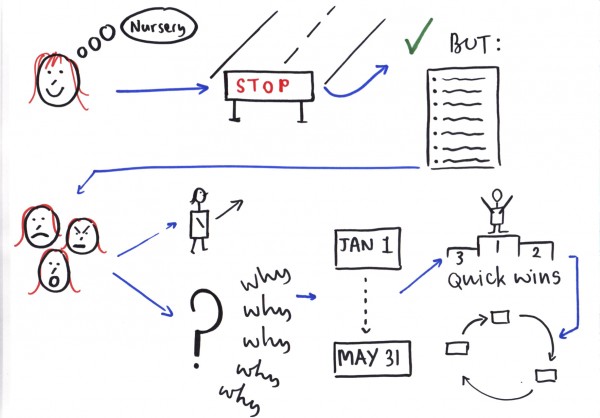
The Dare conference is an exciting new event about learning how to make change, and I’m part of the team behind it. The presentations cover a range of themes that will help attendees learn skills and techniques for getting better outcomes. It’s aimed at digital professionals, I’m going to explain why the ideas are also valuable for people who work in health care (or social care, or charities, or anywhere with other people!)
At the conference people will be talking about:
- learning from mistakes,
- dealing with uncertainty,
- redefining success,
- responding to negative feedback,
- being honest,
- and failing to launch new projects.
When I think back to my time in the NHS, these were all huge issues for my team. Let me give you an example.
When a friend returned to work after her year off on maternity leave, she asked where we were up to in terms of the projects she’d been working on before she left. I was horrified to realise that in a year we hadn’t launched a single project. We’d got stuck – our bosses told us not to tell families about upcoming changes, we were making the same mistakes again and again, and judging our service by meaningless metrics, like number of client contacts. I’d spent my time in unproductive meetings where people responded: “no, but…” to other people’s ideas. No one was taking responsibility for change, including me.
There was also a blame culture. We didn’t respond to individual pieces of negative feedback in a thoughtful or sensitive way, so these escalated into formal complaints. Which led to everyone looking for someone else to blame instead of trying to figure out what we could learn from the situation.
If you’re facing these challenges today come to the Dare conference and learn how to get unstuck. The speakers at the Dare conference aren’t superheroes who have all the answers; they’re going to share their struggles and what they learnt along the way. I think these lessons don’t only apply to folk working in the digital community. We all need to learn how to really listen, to build on each other’s ideas and make changes, in order for our teams to be successful.
The Dare conference is taking place at the South Bank Centre in London on the 23 – 25 September. Check out who’ll be speaking and all the details here.
Are you trying to make a difference in people’s lives but experiencing barriers to making changes? This conference is for you. If you’re a health professional use the discount code ‘therapyideas’ to buy a ticket for £299 +VAT.
Help us spread the word about this event; send the conference details to everyone you think might benefit from support to make change. Tweet about it, or post a message on Facebook or LinkedIn. I hope to see you there!




